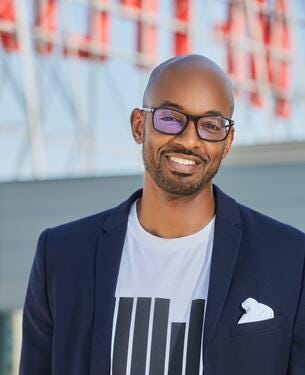Book Update
If you are connected with a book club, progressive community/organization, or any group that might like to have an author event for the Life of Libby book, please contact me to schedule.
Meet Aaron Mitchell
I met Aaron Mitchell at Heroic Public Speaking during a course I took on (you guessed it) public speaking. The company is aptly named because they encourage all of us to “save the world one speech at a time.” Sounds heroic to me.
Aaron’s speech includes a reference to how he pulled off the “biggest bank heist in history.” It’s a compelling statement. I was intrigued when I heard it—especially because I knew Aaron was not a Robin Hood-style bank robber. Yet the “biggest bank heist in history” sounded pretty exciting.
Why Banks Matter
But before we get into the exciting part, I think it’s important to lay the groundwork for why banks matter. If we think about large, Fortune 500 companies, they tend to sell shares on the stock market. This is essentially a source of funding for business operations. But smaller companies, where do they get their funding? Often through bank loans.
When banks loan money to businesses, they are able to survive difficult times and thrive in prosperous times. But without funding, businesses may not even be able to get started; or may not survive a difficult environment—like the pandemic. During the pandemic, minority owned businesses were less likely to receive the PPP forgivable loans that enabled so many companies to survive the pandemic and save their employees’ jobs.
Banks are also important because they fund housing development, commercial space development, and mortgages that enable homeownership. So you can imagine how not having sufficient banking services or sufficient capital can negatively impact communities, small businesses, families, and individuals.
As Aaron described it, “Banking policies and laws intentionally missed black and brown communities and the banks left to service them didn't have the necessary capital to help the communities thrive, in good times or bad.”
In addition, many companies sell goods and services to communities around the country but consolidate their cash in large national banks that do not reach these communities with their banking services. This effectively extracts money from communities—and it has been going on for generations.
The Biggest Bank Heist in History
During the pandemic, Aaron Mitchell was a Director of Human Resources at Netflix. He understood the disproportionate impact that the pandemic was having on Black and Brown communities—physically and financially. He also became aware that black-owned banks (aka minority deposit institutions) which historically served communities that were ignored by large national banks, did not have sufficient funds to meet banking demand. This shortage of capital is part of the reason that only 19 black banks remained in 2020 of the 120+ that existed in the late 1960s.
As he studies the issue further, Aaron gets an idea that he proposes to the CFO of Netflix: transfer a portion of their capital from their existing banks to minority deposit institutions. The CEO of Netflix at the time, Reed Hastings, doesn’t believe in corporate philanthropy. It can’t be a donation, and it has to make good business sense.
After doing additional research and putting together a formal proposal, Aaron pitches the idea to the CEO… and he says yes. Specifically, he says, “It's so capitalistic, it warms my heart.” Netflix transfers $100 MILLION dollars into seven different institutions that are a mix of black-owned banks and Community Development Financial Institutions (like credit unions and institutions involved in community development).
Obviously, that’s a lot of money. But, Aaron also talks about the multiplier effect. These community banks can now loan 10 times the amount of capital. So a bank that receives $10 million in deposits, can now make $100 million in loans!
What Next
It may sound simple, but depositing $100 million to a variety of different institutions takes some planning. Netflix led the way; they created the template and shared it so that other companies could follow. And other companies did follow! A total of $2.2 billion was committed by the end of 2020.
Over the 3 years that followed, this money funded thousands of business and housing loans. It financed the development of 9,000 housing units and one million square feet of mixed-use and commercial space. The influx of investment capital positively affected thousands of communities in places like Mississippi, Alabama, Louisiana, and Arkansas. And while Aaron is no longer able to track all of the funds that companies are investing in these types of institutions, it has continued to grow.
Yet much more could be done. Imagine if all the Fortune 500 companies moved only 2% of their assets into these types of institutions. That would create about $30 BILLION of capital. This is a project that still has much more potential to support the economies of communities that have historically been underserved and stripped of their capital.
The template is set and any company can choose to move their money to these institutions without risk (without even making a donation), while making a positive impact on the economic health of people, small businesses, and communities.
In the next podcast episode, we’ll hear more about what it means to be prosperous without extraction and exploitation. We’ll also talk about how knowing your “superpower” can help you be ready when an opportunity to take action comes your way.











Share this post